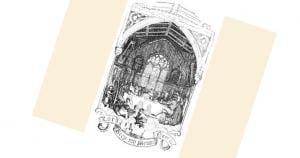Dickens wrote a series of Christmas stories. We know A Christmas Carol best, but in his lifetime A Cricket on the Hearth was mot popular. Almost unknown is The Haunted Man and the story is weaker, but even sub-par Dickens still has something to say.
The story is last, I think, because it contains a lesson Dickens would not learn: our pain, the bad breaks in life, should not be forgotten. We must do right, do our duty, and show mercy to those around us. In Part I, I suggested that Christmas was abandoned, because Dickens wished to be inimitable and Christmas, the story of the Christ, defied even his great skill. It would not submit to him. Eventually his wife, children, and many friends would suffer for the great author’s presumption.
The last Christmas story contained the remedy and one hopes Dickens remembered the tale. Haunted Man is, after all, a story of memory and the ability of even error to redeem.
The Haunted Man (Few Spoilers)
Everybody said he looked like a haunted man. The extent of my present claim for everybody is, that they , were so far right. He did.
This haunted Mr Redlaw is a professor and scientist: a hermit dedicated to chemistry. He is a decent man, but one who thinks he understands the course of his life and that it is bad. He is oppressed by his memories of wrongs done to him and sorrows. Redlaw presumes to know what would have been better and is eaten up coveting what was not and now cannot be. He cannot forgive wrongs done to him, he dwells on them, but he would forget:
“If I could forget my sorrow and wrong, I would,” the Ghost repeated. “If I could forget my sorrow and my wrong, I would!”
He is given the gift of forgetting “sorrow, wrong, and trouble” with results that are not unexpected to any Christian. Our sins are ever before us, but these humble us, make us tender, and teach us to forgive the faults of others.
Or so it should be.
The day will come when we can forget, when troubles are no more, but that day is not yet. This side of death our sorrows, wrongs, and troubles are necessary. They can teach us or so Dickens suggests. He is not suggesting pain is good, but that in God’s good healing of our bad choices, good may come. As the mother, the Mary figure in the story, puts it:
“I have been thinking, Mr. Edmund, that you have been often thinking of late, when I have been sitting by, how true the saying is, that adversity is a good teacher. Health will be more precious to you, after this illness, than it has ever been. And years hence, when this time of year comes round, and you remember the days when you lay here sick, alone, that the knowledge of your illness might not afflict those who are dearest to you, your home will be doubly dear and doubly blest. Now, isn’t that a good, true thing?”
The illness is not good, health is good. Illness can be a blessing if, as Dickens has his heroine suggest, it makes the good things in life “doubly dear and doubly blest.” Most dear of all is forgiveness. God help us how we long, all of us, for forgiveness. We are recall, we feel, and we are sorry. Our sorrow brings an earnest desire to forgive others.
Forgiveness is the mighty force born on Christmas Day that does not forget troubles, but makes something better of them. Against sorrow and mercy Dickens places indifference and presumption. The indifferent grow so callous to the world, the flesh, and the devil they cannot care. The presumptions, the men of science, think they know what is best and withhold mercy in the cold, accurate accounting of what should have been compared to what is. Dickens makes this explicit and he compares one who cannot feel to one who would not feel sorrow:
He is the growth of man’s indifference; you are the growth of man’s presumption. The beneficent design of Heaven is, in each case, overthrown, and from the two poles of the immaterial world you come together.
 Dickens finds hope in Christmas and the severe mercy of Christ. The Haunted Man is a story of forgiveness and the power of the Cross. We cannot be indifferent to suffering or forgetful of the sacrifice of the Incarnation:
Dickens finds hope in Christmas and the severe mercy of Christ. The Haunted Man is a story of forgiveness and the power of the Cross. We cannot be indifferent to suffering or forgetful of the sacrifice of the Incarnation:
“O Thou, he said, “who through the teaching of pure love, hast graciously restored me to the memory which was the memory of Christ upon the Cross, and of all the good who perished in His cause, receive my thanks, and bless her!”
Mayhap Mr Dickens should have recalled that not just the chemists forget God in pride and presumption. Sometimes the literary men, gifted with words, presume and forget that there is one inimitable Word. We can pray that Dickens recollected his better self at the end and so made a good crossing of the river Lethe.
Lord keep our memory green until we can come to redemption of all history at Christ’s great feast.
Lord Jesus Christ, son of God, have mercy on me a sinner.












